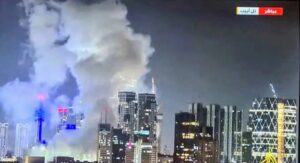

By Barth Ikiebe.

Iran has launched a series of missile strikes toward Israel in response to recent Israeli attacks on its nuclear facilities and senior military officials, marking a sharp escalation in already strained relations between the two countries.
According to the Associated Press, air raid sirens sounded across multiple Israeli cities, including Jerusalem and Tel Aviv, where explosions and smoke were reported. The Israeli military confirmed that dozens of missiles were fired and urged citizens nationwide to seek shelter. No immediate casualties were reported.
The operation, which Iranian state media referred to as “Operation Severe Punishment,” was described by Tehran as a measured response to earlier Israeli airstrikes on key nuclear sites in Natanz, Fordo, and Isfahan. Those strikes reportedly resulted in the deaths of high-ranking Iranian military figures and nuclear scientists.
Iran’s Foreign Ministry strongly criticized the Israeli action, calling it a violation of Iranian sovereignty and an attack on both military and civilian locations. It reported casualties among military personnel and civilians but did not provide specific figures.
In a statement posted on social media, the ministry cited Article 2(4) of the United Nations Charter, which prohibits the use of force against the territorial integrity of any state, labeling the Israeli action a breach of international law. Iran also invoked Article 51, affirming its right to self-defense, and called for international condemnation of what it described as “aggression” by Israel.
Tehran has appealed to the United Nations Security Council, the UN Secretary-General, and members of the international community—including Islamic nations and the Non-Aligned Movement—to take urgent steps in response.
In defense of its actions, the Israeli military, under the codename “Operation Rising Lion,” stated that the earlier strikes were aimed at curbing Iran’s nuclear program. Israeli Prime Minister Benjamin Netanyahu described the operation as a necessary measure to counter “growing threats.”
Israeli defense officials noted that the Iron Dome missile defense system intercepted many of the incoming Iranian missiles, although some damage was reported in parts of Tel Aviv.
The situation has raised concerns globally about a possible wider conflict in the region. Several world leaders and organizations have urged both sides to exercise restraint and pursue diplomatic solutions. India’s Ministry of External Affairs, among others, issued a call for calm and dialogue.
Meanwhile, the UN Security Council has convened to address the rapidly evolving situation. Global oil markets reacted swiftly, with prices climbing over 7% due to fears of supply disruptions.
As both nations remain on high alert, the international community continues to watch developments closely, hoping to avert a broader regional crisis.
Edited by Dada Ahmed.

